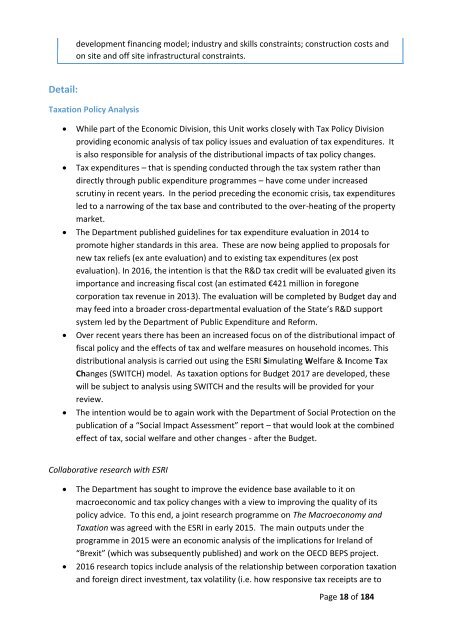Minister’s Brief
20160229%20Minister%20for%20Finance%20Brief%20redacted%20web
20160229%20Minister%20for%20Finance%20Brief%20redacted%20web
Create successful ePaper yourself
Turn your PDF publications into a flip-book with our unique Google optimized e-Paper software.
development financing model; industry and skills constraints; construction costs and<br />
on site and off site infrastructural constraints.<br />
Detail:<br />
Taxation Policy Analysis<br />
<br />
<br />
<br />
<br />
<br />
While part of the Economic Division, this Unit works closely with Tax Policy Division<br />
providing economic analysis of tax policy issues and evaluation of tax expenditures. It<br />
is also responsible for analysis of the distributional impacts of tax policy changes.<br />
Tax expenditures – that is spending conducted through the tax system rather than<br />
directly through public expenditure programmes – have come under increased<br />
scrutiny in recent years. In the period preceding the economic crisis, tax expenditures<br />
led to a narrowing of the tax base and contributed to the over-heating of the property<br />
market.<br />
The Department published guidelines for tax expenditure evaluation in 2014 to<br />
promote higher standards in this area. These are now being applied to proposals for<br />
new tax reliefs (ex ante evaluation) and to existing tax expenditures (ex post<br />
evaluation). In 2016, the intention is that the R&D tax credit will be evaluated given its<br />
importance and increasing fiscal cost (an estimated €421 million in foregone<br />
corporation tax revenue in 2013). The evaluation will be completed by Budget day and<br />
may feed into a broader cross-departmental evaluation of the State’s R&D support<br />
system led by the Department of Public Expenditure and Reform.<br />
Over recent years there has been an increased focus on of the distributional impact of<br />
fiscal policy and the effects of tax and welfare measures on household incomes. This<br />
distributional analysis is carried out using the ESRI Simulating Welfare & Income Tax<br />
Changes (SWITCH) model. As taxation options for Budget 2017 are developed, these<br />
will be subject to analysis using SWITCH and the results will be provided for your<br />
review.<br />
The intention would be to again work with the Department of Social Protection on the<br />
publication of a “Social Impact Assessment” report – that would look at the combined<br />
effect of tax, social welfare and other changes - after the Budget.<br />
Collaborative research with ESRI<br />
<br />
<br />
The Department has sought to improve the evidence base available to it on<br />
macroeconomic and tax policy changes with a view to improving the quality of its<br />
policy advice. To this end, a joint research programme on The Macroeconomy and<br />
Taxation was agreed with the ESRI in early 2015. The main outputs under the<br />
programme in 2015 were an economic analysis of the implications for Ireland of<br />
“Brexit” (which was subsequently published) and work on the OECD BEPS project.<br />
2016 research topics include analysis of the relationship between corporation taxation<br />
and foreign direct investment, tax volatility (i.e. how responsive tax receipts are to<br />
Page 18 of 184


